Potassium Sulfate Market Research, 2032
The global potassium sulfate market was valued at $4.5 billion in 2022, and is projected to reach $7.2 billion by 2032, growing at a CAGR of 4.8% from 2023 to 2032. The potassium sulfate market is driven primarily by the increasing demand for fertilizers in agriculture, particularly for chloride-sensitive crops such as fruits, vegetables, and tobacco. As global populations rise, food production must intensify, thus boosting the need for high-efficiency fertilizers such as potassium sulfate. Its low chloride content makes it ideal for crops that are sensitive to salinity, thus promoting healthier yields. Additionally, the expanding organic farming sector also favors potassium sulfate due to its eco-friendly nature. The compound's role in water-efficient irrigation systems further amplifies its importance, especially in regions facing water scarcity. Rising demand for premium quality produce, along with sustainability-focused agricultural practices, strengthens the market's growth trajectory across different geographies.
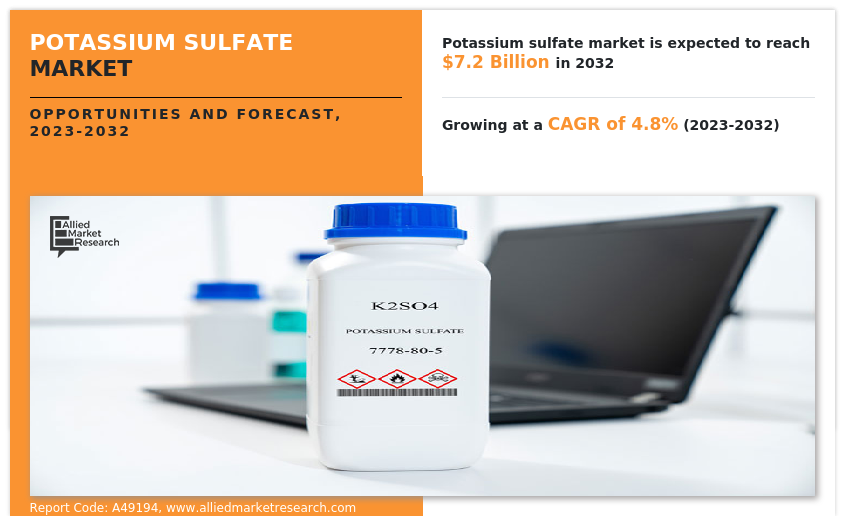
Introduction
Potassium sulfate is an inorganic compound with the chemical formula K2SO4. It is a salt composed of potassium ions and sulfate ions. It is also known as sulphate of potash (SOP).
Potassium sulfate is primarily used as a fertilizer in agriculture. It is valued for its high potassium content, which is an essential nutrient for plant growth and development. Potassium plays a vital role in various physiological processes within plants, including enzyme activation, osmoregulation, and nutrient uptake. It promotes overall plant health, root development, flowering, and fruit quality, thus contributing to higher crop yields.
In addition to its agricultural applications, potassium sulfate is also used in various industrial sectors. It is used in the manufacturing of glass, ceramics, detergents, pharmaceuticals, and potassium alum, which is an important component in the paper and textile industries.
Report Key Highlighters:
The report provides competitive dynamics by evaluating business segments, product portfolios, target market revenue, geographical presence and key strategic developments by prominent manufacturers.
The potassium sulfate market is fragmented in nature among prominent companies such as Compass Minerals International Inc., HALOGENS, Interpid Potash, K+S Aktiengesellschaft, LCP Leuna Carboxylation Plant GmbH, Sesoda Corporation, SQM S.A, Tessenderlo Group, The Mosaic Company., and Yara.
- The study contains qualitative information such as the market dynamics (drivers, restraints, challenges, and opportunities), key regulation analysis, pricing analysis, and Porter’s Five Force Analysis across North America, Europe, Asia-Pacific, LAMEA regions.
- Latest trends in global potassium sulfate market such as undergoing R&D activities, public policies, and government initiatives are analyzed across 16 countries in 4 different regions.
- More than 3,500 potassium sulfate-related product literatures, industry releases, annual reports, and other such documents of key industry participants along with authentic industry journals and government websites have been reviewed for generating high-value industry insights for global potassium sulfate market.
Market Dynamics
The agriculture sector is a significant driver for the potassium sulfate market. Potassium sulfate is commonly used as a fertilizer due to its high potassium content, which is essential for plant growth and crop yield. The demand for food and agricultural products increases with growth in the global population. This, in turn, drives the need for potassium sulfate fertilizers.
Moreover, there is a rise in demand for organic and specialty crops, such as fruits, vegetables, and herbs. These crops require specific nutrient formulations, and potassium sulfate is often used to meet their potassium requirements. The increase in popularity of organic farming practices and the emphasis on healthy and nutritious food contribute to the demand for potassium sulfate.
In addition, potassium sulfate finds applications in various industrial sectors. It is used in the manufacturing of glass, ceramics, detergents, and pharmaceuticals. The growth of these industries directly influences the demand for potassium sulfate. Further, it is used in the production of potassium alum, a vital component in the paper and textile industries.
However, potassium sulfate faces competition from other potassium fertilizers, particularly potassium chloride (potash). It is widely available and often less expensive than potassium sulfate. Farmers may choose potassium chloride as a more cost-effective option, especially in regions where the soil can tolerate the chloride ion content.
On the contrary, collaborations between potassium sulfate manufacturers and agricultural research institutions can foster innovation and market growth. Companies can gain access to cutting-edge knowledge, scientific expertise, and field trials by partnering with research institutions. This collaboration can lead to the development of tailor-made potassium sulfate solutions for specific crops, regional conditions, or farming systems, creating opportunities for market expansion.
In addition, continuous research and technological advancements in the production of potassium sulfate can create opportunities in the market. Innovations in extraction techniques, such as improved methods for obtaining sulfur or potassium from various sources, can enhance the efficiency and cost-effectiveness of potassium sulfate production. These advancements can lead to increased availability and affordability, driving market growth.
Segments Overview
The potassium sulfate market is segmented on the basis of form, purity, end user industry, and region. On the basis of form, the market is categorized into solid and liquid. On the basis of purity, it is classified into up to 99% and greater than 99%. On the basis of end user industry, it is categorized into agriculture, food and beverage, pharmaceuticals, industrial, and others. Region-wise, the market is studied across North America, Europe, Asia-Pacific, and LAMEA.
Potassium Sulfate Market, By Form
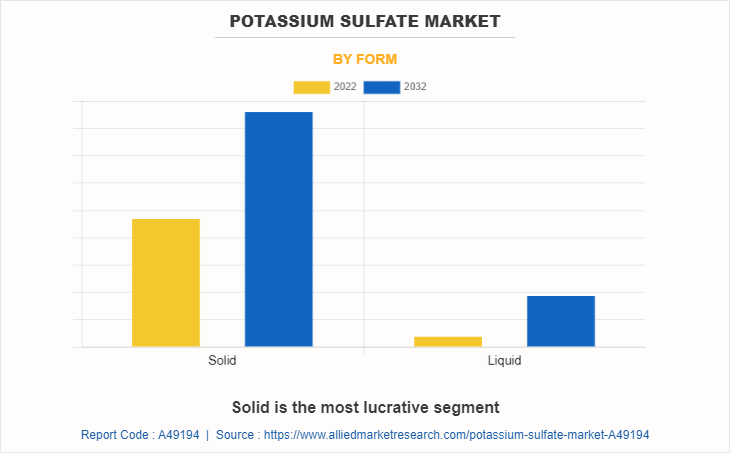
In 2022, the solid segment was the largest revenue generator, and is anticipated to grow at a CAGR of 4.8% during the forecast period. The primary driver of the demand for potassium sulfate (solid form) is the agricultural sector. Potassium is an essential nutrient for plant growth and crop production. Solid forms of potassium sulfate, such as powder, granules, and prills, provide an efficient and convenient way to supply potassium to the soil. Farmers are seeking effective fertilizers like potassium sulfate to optimize crop yields and improve agricultural productivity as the global population grows and food demand increases. This is projected to aid the growth of the potassium sulfate market for solid form.
Potassium Sulfate Market, By Purity
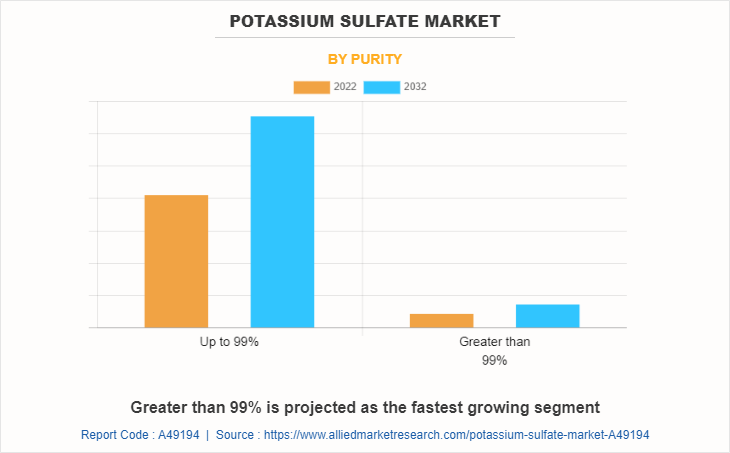
In 2022, the up to 99% segment was the largest revenue generator, and is anticipated to grow at a CAGR of 4.8% during the forecast period. Up to 99% pure potassium sulfate allows for precise nutrient management in agriculture sector. By using a product with a high level of purity, farmers can accurately control the potassium levels in the soil and ensure optimal nutrient balance for crops. This precision helps maximize crop yields and improve overall agricultural efficiency. Furthermore, specialty crops, including fruits, vegetables, and high-value cash crops, often have specific nutrient requirements. These crops demand high-purity fertilizers to avoid introducing unwanted impurities or imbalances into the growing environment. Up to 99% pure potassium sulfate meets the stringent requirements of specialty crop cultivation, which is seeing increasing demand worldwide; thus, boosting the market growth for 99% pure potassium sulfate.
Potassium Sulfate Market, By End-User Industry
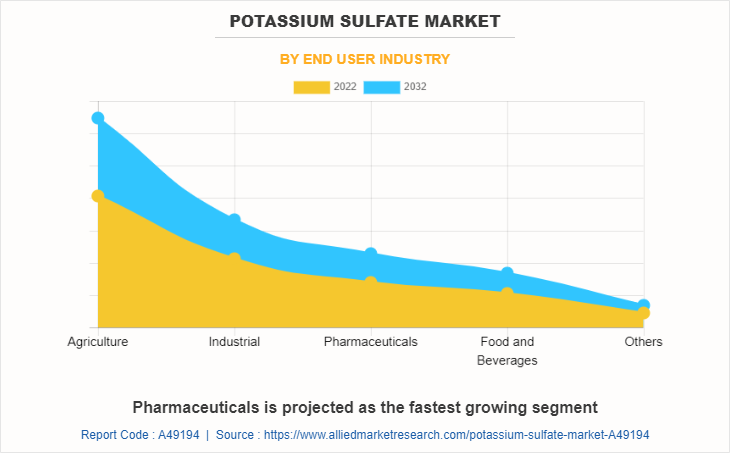
By end user industry, the agriculture segment dominated the global market in 2022, and is anticipated to grow at a CAGR of 4.8% during forecast period. The global population continues to increase, leading to higher demand for food. Potassium sulfate is a valuable fertilizer that promotes crop growth and helps meet the rising demand for agricultural products. As farmers strive to enhance crop yields and productivity, the demand for potassium sulfate as a nutrient source is on the rise. Furthermore, balanced nutrient management is gaining recognition in modern agriculture. Potassium sulfate provides potassium without adding excess nitrogen or phosphorus, which is crucial for maintaining optimal nutrient balance in soils and crops. As farmers prioritize nutrient balancing to improve crop health and sustainability, the demand for potassium sulfate increases; thus, fueling the market growth.
Potassium Sulfate Market, By Geography
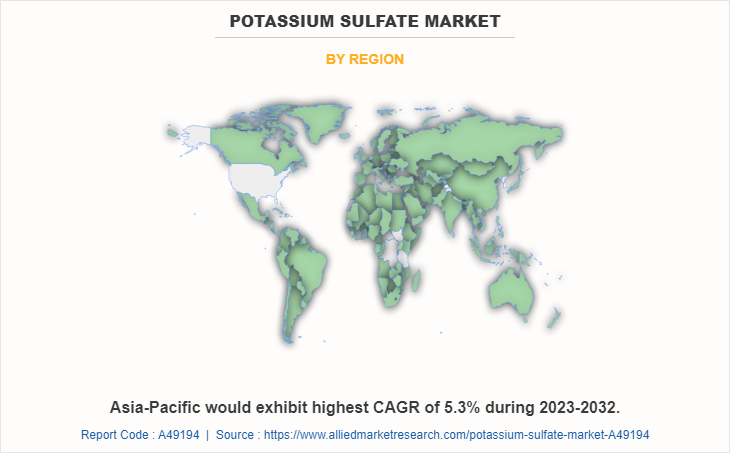
The Asia-Pacific potassium sulfate market size is projected to grow at the highest CAGR of 5.3% during the forecast period and accounted for 47.2% of potassium sulfate market share in 2022. The Asia-Pacific region has a rapidly growing population, driving the demand for food and agricultural products. Farmers are adopting modern agricultural practices and using high-quality fertilizers like potassium sulfate to enhance crop yields to meet the increasing food demand. The rise in population and food requirements present a strong market opportunity for potassium sulfate in the region.
Furthermore, there is a growing awareness in the Asia-Pacific region about the importance of balanced fertilization and optimal nutrient management. Balanced fertilization helps improve crop productivity and minimize environmental impacts. Potassium sulfate, with its balanced potassium content, aligns with this trend and is increasingly adopted by farmers in the region, driving its market growth. In addition, the Asia-Pacific region is witnessing an expansion of specialty crop cultivation, including fruits, vegetables, and high-value cash crops. These crops often require specific nutrient formulations, and potassium sulfate is commonly used to fulfill their potassium requirements.
Competitive Analysis
The global potassium sulfate market profiles leading players that include Compass Minerals International Inc., HALOGENS, Interpid Potash, K+S Aktiengesellschaft, LCP Leuna Carboxylation Plant GmbH, Sesoda Corporation, SQM S.A, Tessenderlo Group, The Mosaic Company., and Yara.
Moreover, the other key players of potassium sulfate market that are not profiled in the report include United Co., Rusal PLC, Migao Corporation, Kemira Kemi AB, China Ching Shiang Chemical Co. Ltd., and others. The global potassium sulfate market report provides in-depth competitive analysis as well as profiles of these major players.
Industry Trends:
- The potassium sulfate market is witnessing significant growth, driven by evolving agricultural practices and rising global demand for food security. Government initiatives supporting sustainable agriculture and efficient fertilizer usage are influencing the market’s trajectory. According to the latest government statistics, many countries are prioritizing low-chloride fertilizers such as potassium sulfate to enhance crop yield in regions with saline soils. For instance, India’s Ministry of Agriculture reported a 12% increase in potassium sulfate consumption from 2022 to 2023 due to its effectiveness in crops such as fruits, vegetables, and nuts. This aligns with global trends toward precision farming and resource-efficient fertilizers.
- In terms of supply-side dynamics, countries with strong potassium resources such as the U.S. and China are witnessing steady production levels. Meanwhile, import-dependent regions such as Southeast Asia are exploring partnerships to secure a stable supply chain for potassium sulfate. In China, the government’s focus on improving domestic production of potash fertilizers, including potassium sulfate, is a key trend as part of its agricultural modernization agenda. The U.S. Department of Agriculture (USDA) data reveals an upward trend in potassium sulfate imports due to the increasing adoption of organic farming practices.
- Moreover, the global focus on sustainability is shaping the potassium sulfate market, with the EU’s Green Deal and various national climate policies promoting the use of eco-friendly fertilizers. Governments are also offering subsidies and incentives for potassium sulfate usage, given its environmental advantages, such as reduced water usage and lower carbon emissions compared to other fertilizers. This supportive policy environment is expected to drive future growth.
Key Benefits For Stakeholders:
- This report provides a quantitative analysis of the market segments, current trends, estimations, and dynamics of the potassium sulfate market analysis from 2022 to 2032 to identify the prevailing potassium sulfate market opportunities.
- The market research is offered along with information related to key drivers, restraints, and opportunities.
- Porter's five forces analysis highlights the potency of buyers and suppliers to enable stakeholders make profit-oriented business decisions and strengthen their supplier-buyer network.
- In-depth analysis of the potassium sulfate market segmentation assists to determine the prevailing market opportunities.
- Major countries in each region are mapped according to their revenue contribution to the global market.
- Market player positioning facilitates benchmarking and provides a clear understanding of the present position of the market players.
- The report includes the analysis of the regional as well as global potassium sulfate market trends, key players, market segments, application areas, and market growth strategies.
Potassium Sulfate Market Report Highlights
| Aspects | Details |
| Market Size By 2032 | USD 7.2 billion |
| Growth Rate | CAGR of 4.8% |
| Forecast period | 2022 - 2032 |
| Report Pages | 564 |
| By Form |
|
| By Purity |
|
| By End User Industry |
|
| By Region |
|
| Key Market Players | SQM S.A, Yara, Sesoda Corporation, Tessenderlo Group, K+S Aktiengesellschaft, Compass Minerals International Inc., HALOGENS, Interpid Potash, The Mosaic Company., LCP Leuna Carboxylation Plant GmbH |
Analyst Review
The global potassium sulfate market is expected to exhibit high growth potential, owing to surge in demand for fertilizers, rapid shift towards balanced nutrient management, rise in specialty crop cultivation, technological advancements, and others. The surge in global population and the need to enhance agricultural productivity to ensure food security are driving the demand for fertilizers, including potassium sulfate. Potassium is an essential nutrient for plant growth, and potassium sulfate provides an effective source of potassium to support crop yields. Furthermore, farmers and agricultural experts are increasingly recognizing the importance of balanced nutrient management in crop production. Potassium sulfate, being a balanced source of potassium without excessive nitrogen or phosphorus, aligns with the goals of sustainable and efficient agriculture. This shift in agricultural practices is driving the demand for potassium sulfate.
Moreover, advancements in agricultural technologies, precision farming, and irrigation systems are increasing the efficiency and precision of nutrient management. These technologies require high-quality fertilizers like potassium sulfate to achieve optimal nutrient delivery and maximize crop yields. Technological advancements in agriculture are driving the demand for potassium sulfate.
CXOs further added that sustained economic growth coupled with rapid development of organic farming sector may lead the potassium sulfate market to witness a significant growth.
Escalating demand from agriculture sector, growing demand for organic and specialty crops, increase in industrial applications, government support and regulations, and shift towards balanced fertilization are the upcoming trends of potassium sulfate market in the world.
Agriculture is the leading application of potassium sulfate market.
Asia-Pacific is the largest regional market for potassium sulfate.
The potassium sulfate market was valued at $4.5 billion in 2022 and is estimated to reach $7.2 billion by 2032, exhibiting a CAGR of 4.8% from 2023 to 2032
Compass Minerals International Inc., HALOGENS, Interpid Potash, K+S Aktiengesellschaft, LCP Leuna Carboxylation Plant GmbH, Sesoda Corporation, SQM S.A, Tessenderlo Group, The Mosaic Company., and Yara are the top companies to hold the market share in potassium sulfate market.
Loading Table Of Content...
Loading Research Methodology...



